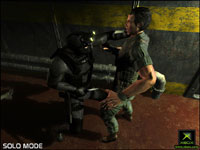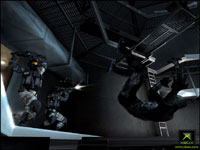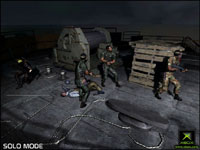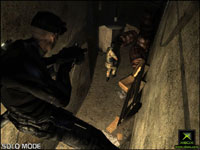

Review: Splinter Cell - Chaos Theory 194
- Title: Splinter Cell: Chaos Theory
- Developer: Ubisoft Montreal
- Publisher: Ubisoft
- System: Xbox
- Reviewer: Zonk
- Score: 9/10
 Splinter Cell titles
center around the missions of Sam Fisher, an American
military tool in the information warfare age. Chaos Theory, like the titles
that preceded it, follow the exploits of Mr. Fisher as he moves from one
mission to another. Events and characters that mimic real world analogues very
closely fill the game, and despite some nonexistent devices to further gameplay
(like hacking a computer from across a room), the impression you receive is that
Sam Fisher's world is very much our own.
Splinter Cell titles
center around the missions of Sam Fisher, an American
military tool in the information warfare age. Chaos Theory, like the titles
that preceded it, follow the exploits of Mr. Fisher as he moves from one
mission to another. Events and characters that mimic real world analogues very
closely fill the game, and despite some nonexistent devices to further gameplay
(like hacking a computer from across a room), the impression you receive is that
Sam Fisher's world is very much our own.As such, the entire game is steeped in realism to preserve the flavour of the modern day experience. The graphics and lighting are gorgeous, and the fluidity of motion that the game's character portray is extremely impressive. The artificial intelligence of enemy opponents, while not perfect, is certainly better than many other titles in the stealth genre. This allows for some lovely emergent gameplay, as you can take actions in the game world and can plan on a logical reaction taking place. The first mission allows you a perfect opportunity to try this out, with two mercenaries patrolling near a tent. Taking out the merc outside the tent allows you access to the generator for a large lighting system nearby. By turning off the generator, you make the guard inside the tent curious...a vice which gets cats and guards in trouble.
 The need for stealth in
the game is paramount, but not as rigorously enforced as
in previous titles. You can set off as many alarms as you like, and until you
are slain the mission isn't over. This, and nearly every other, addition to the
Splinter Cell gameplay library was made to make the game more accessible to
players. The addition of a knife to Sam's arsenal allows him to take out
enemies in a single thrust in near silence. Gunshots are noisy and attract
attention, but laying out your opponents with deadly fire is an accepted way to
complete a mission. The previous titles were extremely punishing of mistakes,
and Chaos Theory counteracts that by allowing Sam to take on a more kick-ass
take-names approach. If you've played the previous incarnations a great deal,
you may find the going easier than you expect. Higher difficulty settings are
provided to challenge the more skilled. This eased gameplay also allows for
more than one way to complete a mission. Even if you decide to kill the captain
of the cargo ship without interrogating him, you can still sweep the ship with
your weapon drawn looking for your target. Arbitrariness and gameyness have
been deliberately reduced.
The need for stealth in
the game is paramount, but not as rigorously enforced as
in previous titles. You can set off as many alarms as you like, and until you
are slain the mission isn't over. This, and nearly every other, addition to the
Splinter Cell gameplay library was made to make the game more accessible to
players. The addition of a knife to Sam's arsenal allows him to take out
enemies in a single thrust in near silence. Gunshots are noisy and attract
attention, but laying out your opponents with deadly fire is an accepted way to
complete a mission. The previous titles were extremely punishing of mistakes,
and Chaos Theory counteracts that by allowing Sam to take on a more kick-ass
take-names approach. If you've played the previous incarnations a great deal,
you may find the going easier than you expect. Higher difficulty settings are
provided to challenge the more skilled. This eased gameplay also allows for
more than one way to complete a mission. Even if you decide to kill the captain
of the cargo ship without interrogating him, you can still sweep the ship with
your weapon drawn looking for your target. Arbitrariness and gameyness have
been deliberately reduced.
 That sense of realism is
extended by the story and voice acting. The tale
centers around a series of missions which take you from one end of the earth to
the other. Each mission has a good deal of background to it, and the depth of
the Chaos Theory story is entirely at your discretion as the mission briefings
are entirely skippable. Each portion of the mission briefing is handled by one
of the memorable non-player characters, each with their own area of expertise.
The memorable nature of these characters is solely based on the quality of the
dialogue writing, which comes off very natural and spiced with quality humor,
and the skill with which the voice actors portray their roles. Fan favorite Don
Jordan returns as Irving Lambert, and Michael Ironside returns to the tight
fitting bodysuit of Sam Fisher.
That sense of realism is
extended by the story and voice acting. The tale
centers around a series of missions which take you from one end of the earth to
the other. Each mission has a good deal of background to it, and the depth of
the Chaos Theory story is entirely at your discretion as the mission briefings
are entirely skippable. Each portion of the mission briefing is handled by one
of the memorable non-player characters, each with their own area of expertise.
The memorable nature of these characters is solely based on the quality of the
dialogue writing, which comes off very natural and spiced with quality humor,
and the skill with which the voice actors portray their roles. Fan favorite Don
Jordan returns as Irving Lambert, and Michael Ironside returns to the tight
fitting bodysuit of Sam Fisher.
The score, by Amon Tobin, nicely accentuates the mood and temp of the game with a modern vibe that never feels as though it was composed by software. Tobin's composition, his first for a videogame, is very promising. I hope to hear more from him in the future.
 Like the previous title,
Pandora Tomorrow, Chaos Theory isn't something you have
to enjoy alone. Multiplayer via Xbox Live is once again a unique experience.
The four-player Mercenaries vs. Spies gameplay returns, with some tweaks and
refinements. To ensure that you're briefed on the objectives of the multiplayer
game, you are required to go through a training scenario. The maps allow you a
range of several types of gameplay, including a deathmatch, a disk capture mode
that is a variation on keep-away, and a new story mode. Story mode is probably
the most interesting addition, forcing the mercs and spies to complete several
missions in sequence and tying them all together with a workable plot. Chaos
Theory has a lot of living room local multiplayer potential as well, with four
cooperative levels available. There are several moves that two spies working
together can accomplish, and the gameplay is accentuated by a story which works
the co-op levels in as part of the backstory to the single player campaign.
Like the previous title,
Pandora Tomorrow, Chaos Theory isn't something you have
to enjoy alone. Multiplayer via Xbox Live is once again a unique experience.
The four-player Mercenaries vs. Spies gameplay returns, with some tweaks and
refinements. To ensure that you're briefed on the objectives of the multiplayer
game, you are required to go through a training scenario. The maps allow you a
range of several types of gameplay, including a deathmatch, a disk capture mode
that is a variation on keep-away, and a new story mode. Story mode is probably
the most interesting addition, forcing the mercs and spies to complete several
missions in sequence and tying them all together with a workable plot. Chaos
Theory has a lot of living room local multiplayer potential as well, with four
cooperative levels available. There are several moves that two spies working
together can accomplish, and the gameplay is accentuated by a story which works
the co-op levels in as part of the backstory to the single player campaign.
Nothing is perfect, of course. While I enjoyed the game, my previous experience with Splinter Cell titles is limited. I found the game challenging on Normal mode, but players who have honed their skills on less forgiving titles may view the single player campaign as a cakewalk. The darkness mechanic can start to feel slightly contrived after a while, as you move through areas that wouldn't be as dark as the game allows them to be. The realism of other areas of the game makes it a jarring experience when you find a well guarded part of a bank in pitch blackness. The co-op mode, finally, could have been more fleshed out. Cooperative play is one of the most interesting aspects of modern gaming, and I would have liked to see a more developed co-op aspect for this title. Minor complaints, but the attention to detail that the game takes in all other areas makes weak points stand out.
For fans of the previous games, and players who enjoy modern tales, Splinter Cell: Chaos Theory is a perfect fit. It has a sensibility all its own, and the high praise it has garnered around the industry is well deserved. If you're looking for a stealth action title, Chaos Theory will fit your needs with military exacting precision.
Screenshots are from Microsoft's official Splinter Cell: Chaos Theory Xbox site, ©2005 Microsoft and Ubisoft.


Apparently the article tried some stealth too... (Score:5, Funny)
Brought to you by... (Score:3, Funny)
Now they have to change the commercial!!!!! (Score:2, Funny)
- Slashdot Daily -
[Fade to Black]
Yiff? (Score:1, Funny)
Re:Two out of Four... (Score:5, Funny)
Re:MGS (Score:3, Funny)
Mandatory Penny Arcade reference (Score:2, Funny)
Spilter Cell: Popcorn eyeglasses [penny-arcade.com]
RTFM (Score:4, Funny)
Which is exactly why the good folks at Ubisoft took the time to outfit you with night vision goggles.
Re:Two out of Four... (Score:5, Funny)
The guy's older than me, yet I can't help but think that I have far more gaming experience. He's apparantly unaware of just what happens when a genre becomes popular.
Just you wait Zonk. Give it two years and these stealth games will contain headshots, big explosions, high speed racing, and athletic prowess. As well as conspicuously placed fruit in numerous quantities, which will be required to develop the miracle drug that saves the president from heart failure (and opens up secret fantasy levels with stars and hearts).
Sincerely apologizing for the run on sentence,
-deltasigma-